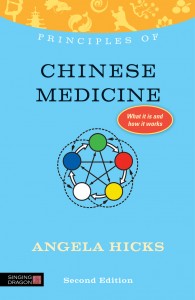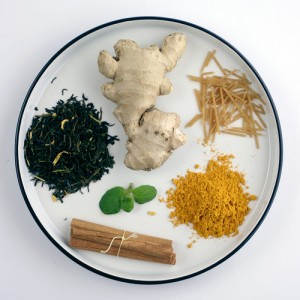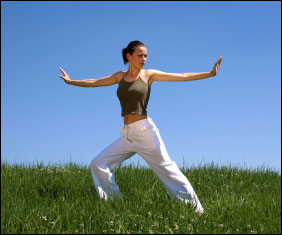by Angela Hicks
 When you hear the words ‘Chinese medicine’ what comes to your mind? I bet you think of acupuncture! Most people do. But in fact there are five therapies included in Chinese medicine.
When you hear the words ‘Chinese medicine’ what comes to your mind? I bet you think of acupuncture! Most people do. But in fact there are five therapies included in Chinese medicine.
The five strands of Chinese medicine are:
- Acupuncture
- Chinese herbs
- Tuina (massage)
- Qigong (exercises)
- Dietary therapy
In my book Principles of Chinese Medicine I explain how each of these treatments are used, and I give lots of examples – so if you are thinking of seeing a Chinese medicine practitioner you will know exactly what to expect. All of these therapies have been tried and tested over thousands of years – and the research base from China and the West is extensive too – proving to us how well they work.
The truth about acupuncture needles
Acupuncture is the most well-known Chinese medicine treatment (which is why you probably thought of it first!) and perhaps the most frequently practiced in the West. Acupuncture is enjoyed by millions of people throughout the world and the benefits are huge. Sadly some people miss out on its benefits because they are afraid that needles will be painful. So what is the truth about needles?
The good news is that needles create a dull sensation rather than pain. In my book some patients give descriptions such as a ‘tingling feeling’, a ‘dull ache’ or a ‘pulling sensation’. Unlike when you see a dentist, which many people dread, patients are likely to enjoy visiting their acupuncturist. They find treatment improves their well-being as well as curing their illnesses.
On top of this, a practitioner will use only a few very fine needles (and by the way, those awful photos of people with hundreds of needles in them are sensational and not realistic). And finally, of course, all practitioners use impeccable standards of hygiene and all needles are disposable and used only once.
So if you want treatment and were put off by the thought of needles – maybe think again!
The truth about Chinese herbal medicine
There are still rumours that Chinese herbalists use animal products in their prescriptions, and also products that come from endangered species. Not true! In the West the use of animal products is not only prohibited but practitioners don’t even want to use them. The Register for Chinese Herbal Medicine, one of the largest Chinese herbal medicine professional bodies, says on its website, ‘we strongly condemn the illegal trade in endangered species and have a strict policy prohibiting the use of any type of endangered species by any of our members’.
Chinese herbs effectively treat many conditions and are used extensively in most Chinese hospitals. Why are they used so much? Because they have been keeping Chinese people healthy for thousands of years. So maybe they could help you too – and you won’t be harming any animals in the process, only helping yourself.
Some dietary therapy truths
The final therapy in Chinese medicine is dietary therapy. This is an age-old system of dietary advice that has been handed down through generations. Dietary therapy is consistent, logical and tried and tested. In China many people are conscious of what constitutes a healthy diet. In contrast, in the West advice is constantly changing – the latest food ‘fad’ tells us to eat more meat, or more carbohydrates, or that fat is bad for you – or maybe good for you. We are inundated with conflicting information. We are confused and no wonder. There is a myth that Chinese dietary therapy is just another fad. No it isn’t. Chinese dietary therapy gives us a way of eating that is simple, nourishing and can keep us healthy for life.
The truth about Chinese massage treatments
When we think of massage we often think of relaxation. Patients who have Chinese massage say it is very relaxing in fact they may leave treatment as if floating on cloud nine! There is, however, a myth that this is all it can do. But there is much more to it than this. Tuina massage (pronounced twee nar) is also a very effective system of treatment. It not only deals with joint problems which you might expect, it can also help many other conditions including digestive complaints, lung illnesses, gynecological problems and much more.
In my book you will read the story of a patient cured of a stomach problem she had had for over 20 years that no one else could help! So if you come to have some tuina don’t rule out a miracle from that as well!
The truth about qigong practice
Qigong (pronounced ‘chee gong’) is an umbrella term that covers a vast array of Chinese exercises including tai chi. They are not the usual exercises you might do. These exercises are gentler and are performed more slowly than exercises performed in a gym. And you’ll have different results from practicing them than from going to the gym. The most common myth is that qigong is so gentle that it is less effective than vigorous exercise. Somehow we feel we must do something and maybe push a bit to know exercise benefits us. When you do qigong you might not even feel you are doing much. These exercises have, however, been shown to have a profound effect on people’s health. For example, here are results from studies into the psychological and physiological effects of qigong and tai chi covering a total of 6410 participants from 13 countries: Effects included improved bone strength, better lung and heart fitness including lower blood pressure, improved overall physical functioning, prevention of falls and improved balance. They also create better immunity, an improved general quality of life and a positive change in psychological factors such as general well-being, anxiety and depression.
So who says you have to work hard to get results? There’s another saying – doing less is doing more – and in the case of qigong it’s very true.
Now that you know a little more about Chinese medicine you might have a dilemma. Which one do I choose? I’m afraid you’ll have to make the choice yourself! If you want more information, my book Principles of Chinese Medicine might help you decide.